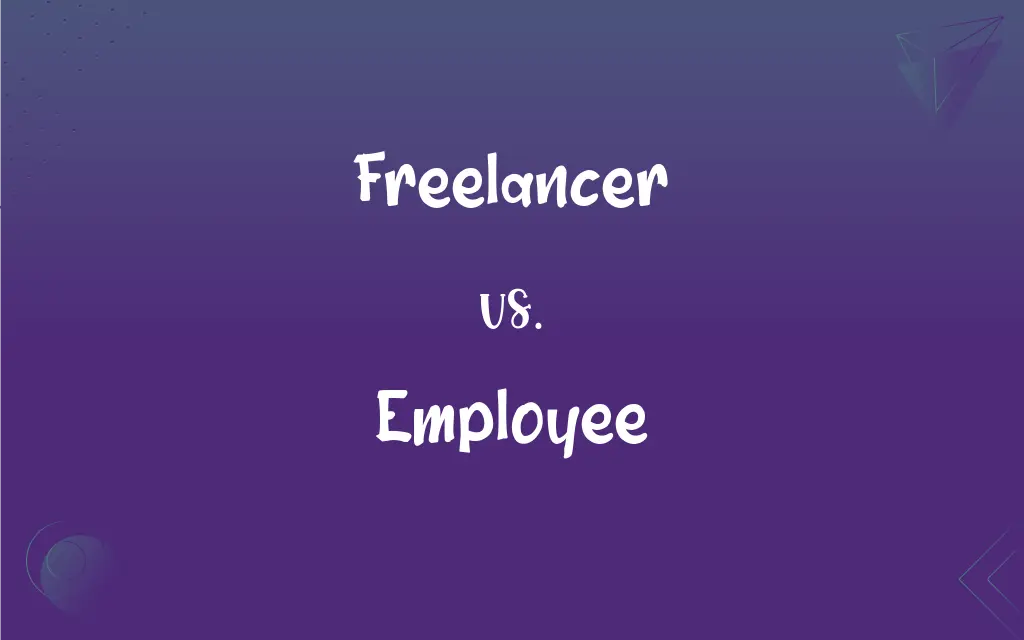Freelancer vs. Employee: What's the Difference?
Edited by Harlon Moss || By Janet White || Updated on October 9, 2023
A Freelancer works independently, offering services on a project basis, while an Employee is hired by a company with a structured salary and benefits.

Key Differences
Freelancer and Employee are terms that distinguish individuals based on their work arrangements and professional commitments. Both play crucial roles in modern economies, but their working dynamics vary considerably.
A Freelancer operates independently, often juggling multiple clients or projects concurrently. They don't have a long-term obligation to any specific company. Contrarily, an Employee typically has a long-term commitment to one employer, working fixed hours and executing specified job roles.
Financial dynamics differ between Freelancers and Employees. A Freelancer usually gets paid per project, task, or upon reaching certain milestones. In stark contrast, an Employee receives a regular salary, often accompanied by benefits like health insurance, paid leave, and retirement contributions.
Professional stability can be a distinguishing factor. While Freelancers might face periods without work, they enjoy flexibility and autonomy. Employees, on the other hand, have job security, but they're bound by company rules, schedules, and protocols.
The relationship with the client or company also varies. A Freelancer might interact directly with clients, handling everything from negotiation to delivery. Meanwhile, an Employee might be a part of a larger team, with specific roles and a structured hierarchy guiding their interactions.
ADVERTISEMENT
Comparison Chart
Work Arrangement
Works independently on a project basis
Long-term commitment to one company
Payment
Per project/task/milestone
Regular salary with possible benefits
Stability
Variable, periods without work
More stable, with set hours and tasks
Relationship
Directly interacts with clients
Part of a larger team or hierarchy
Flexibility
High flexibility in hours and tasks
Fixed hours, specific roles, bound by company rules
ADVERTISEMENT
Freelancer and Employee Definitions
Freelancer
A professional working independently without long-term commitment.
The company hired a Freelancer for their website redesign.
Employee
An individual hired by a company with a structured salary.
The Employee received a bonus for outstanding performance.
Freelancer
Someone offering specialized services on a per-project basis.
As a Freelancer, she managed projects for various clients.
Employee
A person working under a long-term commitment to an employer.
She was a dedicated Employee for five years.
Freelancer
A self-employed person providing specific services.
The Freelancer's expertise was in graphic design.
Employee
Someone working fixed hours with specific responsibilities.
The Employee clocked in at 9 am daily.
Freelancer
An individual not bound by traditional employment contracts.
He enjoyed the freedom of being a Freelancer.
Employee
An individual entitled to company benefits and protections.
Every Employee was covered by the company's health insurance.
Freelancer
A worker juggling multiple clients or tasks simultaneously.
The Freelancer balanced three projects this month.
Employee
A worker who is part of a company's regular staff.
The new Employee underwent a week-long orientation.
Freelancer
A person who sells services to employers without a long-term commitment to any of them.
Employee
A person who works for another in return for financial or other compensation.
Freelancer
One who freelances
Employee
An individual who provides labor to a company or another person.
One way to encourage your employees to work harder is by giving them incentives.
Employee
One employed by another.
Employee
A worker who is hired to perform a job
FAQs
Do Employees always get benefits like health insurance?
Not always; it depends on the company and employment contract.
Can a Freelancer work for multiple companies?
Yes, Freelancers often juggle multiple projects or clients simultaneously.
Do Freelancers receive paid vacations?
Typically, Freelancers don't receive traditional benefits like paid vacations.
Can an Employee also freelance on the side?
It's possible, but they should check their employment contract for any restrictions.
Is job security higher for an Employee?
Generally, Employees have more job security than Freelancers.
Do Freelancers need a formal contract?
It's advisable for Freelancers to have contracts to outline terms and protect their interests.
Are there any legal protections for Employees?
Yes, many countries have labor laws protecting Employee rights.
Are Freelancers considered self-employed?
Yes, Freelancers are typically considered self-employed.
How do Freelancers find work?
Through networking, job platforms, or direct client outreach.
Can an Employee negotiate their salary?
Yes, Employees can often negotiate their salary during the hiring process.
Can a Freelancer set their own working hours?
Yes, one of the benefits of freelancing is the flexibility in setting work hours.
Are Employees entitled to overtime pay?
In many places, Employees are entitled to overtime pay, but it depends on local labor laws.
How do Freelancers handle taxes?
Freelancers often handle their own tax payments, considering they're self-employed.
Is it easier for a Freelancer to switch industries?
Freelancers might find it easier to pivot, given their flexibility and varied project experiences.
How do Employees grow in a company?
Employees can receive promotions, undertake training, or take on new roles.
About Author
Written by
Janet WhiteJanet White has been an esteemed writer and blogger for Difference Wiki. Holding a Master's degree in Science and Medical Journalism from the prestigious Boston University, she has consistently demonstrated her expertise and passion for her field. When she's not immersed in her work, Janet relishes her time exercising, delving into a good book, and cherishing moments with friends and family.
Edited by
Harlon MossHarlon is a seasoned quality moderator and accomplished content writer for Difference Wiki. An alumnus of the prestigious University of California, he earned his degree in Computer Science. Leveraging his academic background, Harlon brings a meticulous and informed perspective to his work, ensuring content accuracy and excellence.






































































